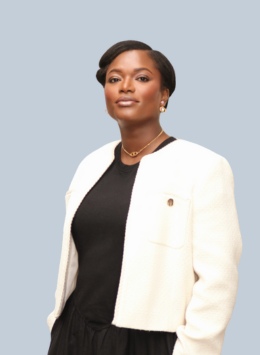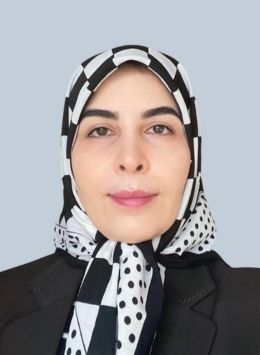Freckles and Solar Lentigos
Home » Conditions » Freckles and Solar Lentigos
Get Back Your Confidence
Not sure about your condition? Get in touch now, there is no reason for you to wait.
Award winning dermatology service, with over 20 years of experience
Short waiting lists, on some occasions offering same week appointments
Safe environment, in Care Quality Commission approved facilities
SOLAR LENTIGOS Treatment & freckle removal LONDON
The word lentigo simply describes a patch of skin that contains a greater density of cells called melanocytes which produce a dark pigment called melanin. There are many different types of lentigo, but the commonest are caused by the sun – solar lentigos. These are non-cancerous brown spots which are thought to develop in response to sun-exposure, especially in those with fairer skin. They can appear anywhere but tend to form on the face, neck, shoulders and forearms. Unlike freckles they usually appear after the age of 30.
The main difference between a freckle and a solar lentigo is that in a freckle only the amount of pigment being produced by melanocytes is increased, rather than the actual number of cells.
Alternative names: Liver spot, old age spot, senile freckle, sun spots (singular: lentigo)
WHAT CAUSES FRECKLES AND SOLAR LENTIGOS?
These are non-cancerous brown spots which are thought to develop in response to sun-exposure, especially in those with fairer skin. They can appear anywhere but tend to form on the face, neck, shoulders and forearms (areas usually most exposed to sun). Unlike freckles they usually appear after the age of 30.
WHAT DO SOLAR LENTIGOS AND FRECKLES LOOK LIKE?
Solar lentigos are flat spots which vary in colour from yellow-brown to dark brown-black, depending on skin tone. They are generally much larger than freckles being >5mm in width. The number and size of solar lentigos often increases with age, and in comparison to freckles, they do not fade much during the winter months.
Though freckles and solar lentigos are harmless, it is important to recognise certain differences between these and early malignant melanoma (a type of skin cancer). If a brown spot with an irregular border or multiple colours has appeared recently, or if you have any doubts, please seek medical advice immediately.
Though freckles and solar lentigines may be mistaken for malignant melanoma, they do not themselves turn into cancer, and thus are benign. However, some people find them cosmetically unappealing, especially on the face.
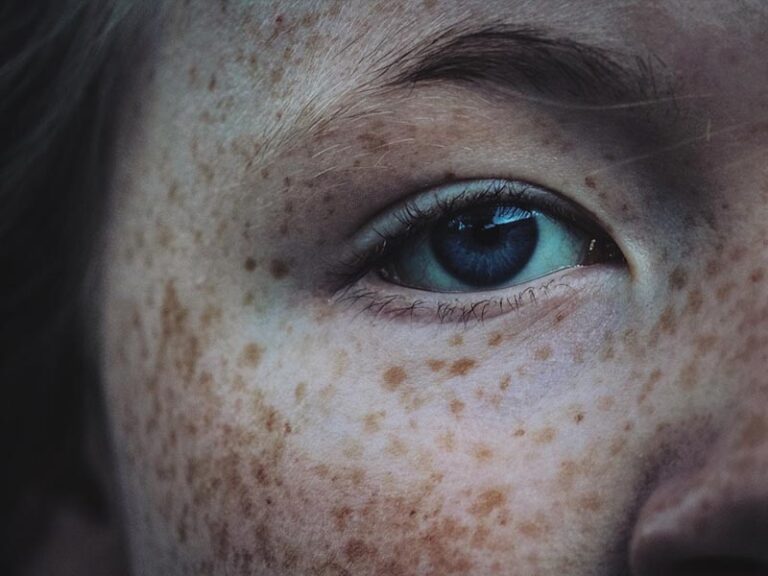
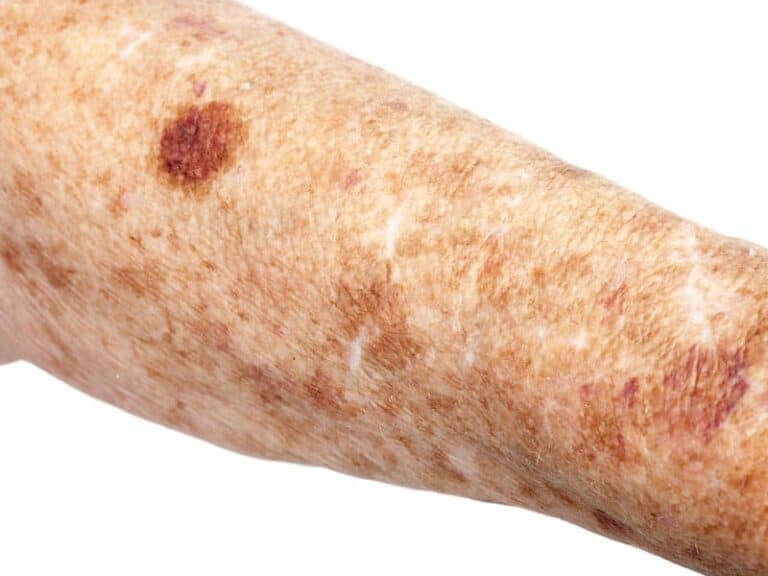
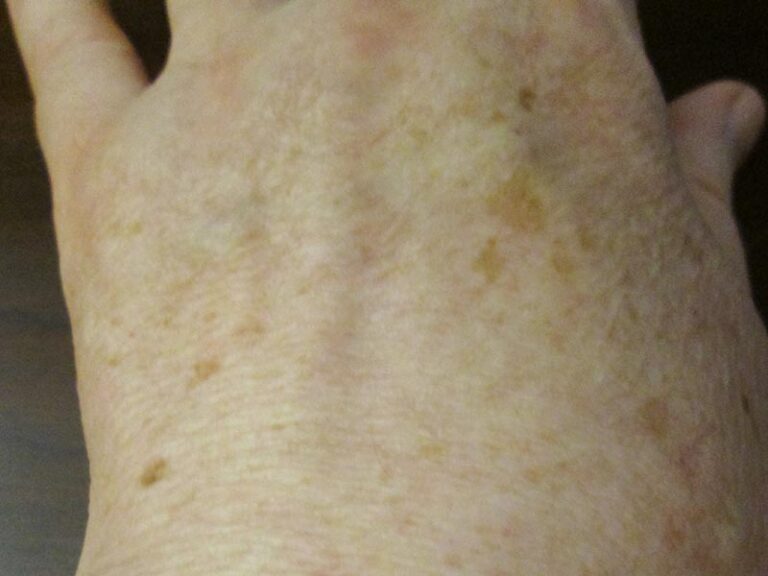
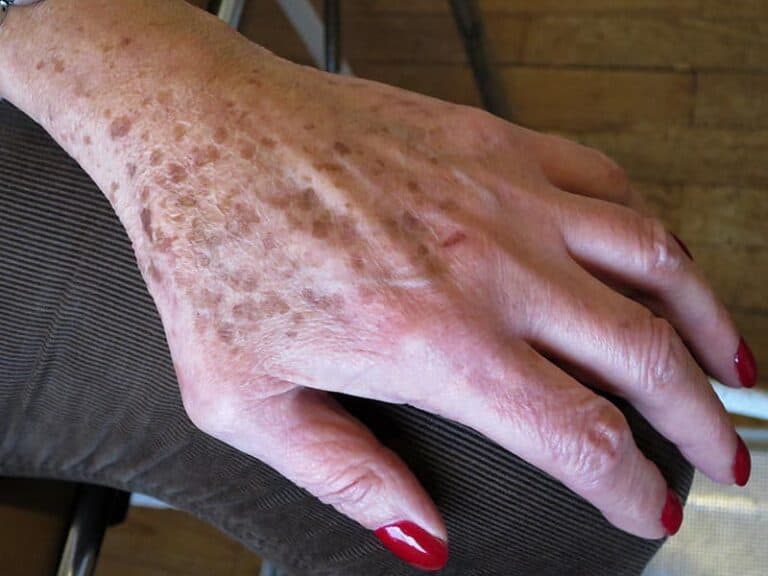
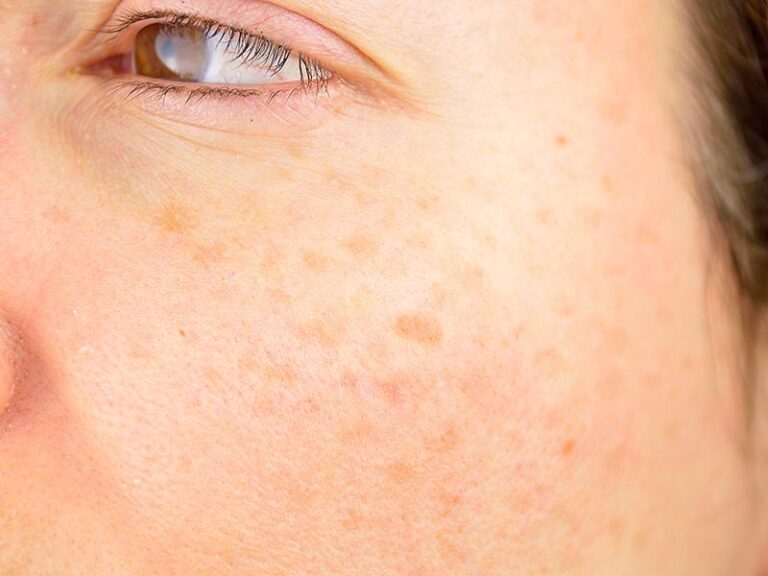
HOW CAN FRECKLES AND SOLAR LENTIGOS BE TREATED?
Adopting good sun-protection habits is the best way to prevent freckles and solar lentigines from developing or worsening. Cover up, especially between peak times from 11-4pm during hot days and wear sunscreen on exposed sites. However, for those that have already formed, there are treatments available to reduce their appearance. Briefly these include:
- Lightening creams containing tretinoin or hydroquinone
- Chemical peels
- Cryotherapy (freezing)
- Laser treatments
- Intense pulsed light treatment
- Bespoke Prescriptive Facials
The aesthetic outcome of these therapies varies from person-to-person, but in experienced hands results can be impressive.
Our Specialist Dermatologists at the Harley Street Dermatology Clinic can offer effective treatment for all types of sun damage including solar lentigos.
FREQUENTLY ASKED QUESTIONS
ARE FRECKLES DANGEROUS?
Though freckles and solar lentigines may be mistaken for malignant melanoma, they do not themselves turn into cancer, and thus are benign. However, some people find them cosmetically unappealing, especially on the face.
WHAT CAUSES FRECKLES TO SUDDENLY APPEAR?
The exposure to UV-B radiation activates melanocytes to increase melanin production, which can cause freckles to become darker and more visible. Freckles are therefore more visible following exposure to sunlight.
CAN FRECKLES TURN INTO MOLES?
No, freckles can’t turn into moles. Freckles appear due to sun exposure or genetics, whereas moles appear after the skin cells develop into a cluster instead of spreading out on the skin.
WHAT AGE DO FRECKLES MOST COMMONLY APPEAR?
The average age that children develop freckles is between 2 and 4 years old.
ARE FRECKLES A SIGN OF SUN DAMAGE?
Freckles actually act like sun cream and are a natural way for the skin to block dangerous UV rays from penetrating the deeper layers of skin. They aren’t a sign of sun damage but actually protect areas of the skin that are particularly sensitive to UV light.
HEAR FROM OUR PATIENTS
Start Your Journey With Us
Please fill in this form and one of our team will give you a call back to arrange a consultation with one of our expert dermatologists.
WHY TREAT YOUR FRECKLES & SOLAR LENTIGOS AT THE HARLEY STREET DERMATOLOGY CLINIC?
Having the right dermatologist is important especially when you have a chronic skin condition that will require ongoing treatment. We want you to feel confident that we’re providing you with the best possible care. We also want you to feel as comfortable as possible with your dermatologist.
The Harley Street Dermatology Clinic specialises in conditions affecting the skin, hair and nails. Our goal is to provide all the care that you need when you’re experiencing these kinds of problems. We want to make it easy for you to access the best quality solar lentigos treatment and freckle removal in London.
The clinic is conveniently located in Central London, so it’s easy to visit us if you need to see a dermatologist. You will find yourself in a very comfortable and welcoming environment. We have created a relaxing space where you will receive the highest quality of care. We are regulated by the Care Quality Commission, are part of the British Association of Dermatologists and are top rated by patients of Doctify so you can be sure of safe and effective treatment with us.
Latest INSIGHTS AND ADVICE

Winter Skin Conditions
Winter weather can take a heavy toll on our skin. We are constantly stepping between the warm, heated rooms indoors and the cold, dry air outside. We also tend to wrap up more at this time of year, which can cause problems if clothes are

Should You Worry About Sun Damage in Winter?
Sun damage isn’t usually a problem in the UK in winter. The UV rays are not usually strong enough at this time of year to cause sunburn, but they can still affect your skin. Sun damage is responsible for many of the skin conditions treated

Are The Effects of Skin Conditions Underestimated?
Skin conditions can be embarrassing, uncomfortable and tricky to treat, but they are often dismissed as minor or cosmetic problems. It’s time we all took our skin more seriously.

